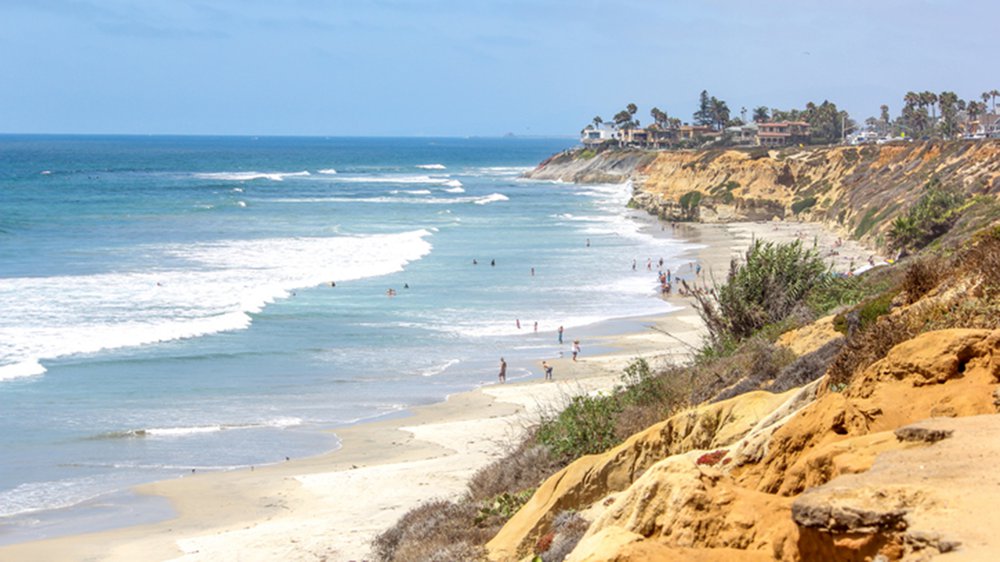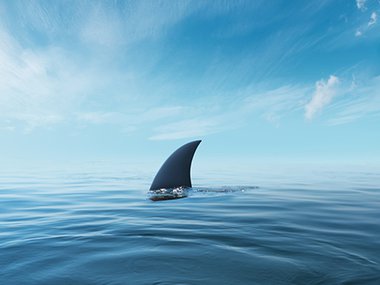Ocean Depths and Shark Tales: Diving into Fear
You are floating in the Atlantic Ocean, miles away from land. The waves rock you around. Dipping your head into the water, you can’t see the bottom. You try to get your bearings but there’s only darker and darker water. Did something just bump into your foot? Was that a shark? Will you be eaten?

Image credit: Getty Images
Some people are scared of the ocean and the creatures that live in it. Even if you wouldn’t call yourself all-out scared, you might be frightened of specific encounters. The chance of being eaten is certainly terror-inducing, and sharks are predators, but is being eaten by a shark something we should worry about? Let’s explore this two ways: with neuroscience and risk management.
Being fearful is an important response we evolved to have to survive dangerous threats. Our brain recognizes the threat and prepares the body to quickly deal with it. This is called our stress response.
Stress activates both the nervous system and hormone system. Nerves open the eyes to see better, accelerate the heartbeat to pump more blood to muscles and dilate the lungs to take in more oxygen. Hormones like adrenaline travel throughout the body and increase alertness, decrease fatigue and decrease pain awareness. All these changes happen in a fraction of a second so the body is ready to react immediately.

Image Credit: Getty Images
The stress system prepares the body for two main survival techniques: fight or flight. Most of the time, it makes sense to flee–escaping the threat means avoiding harm–but in certain situations we’re required to deal with the threat head on through a fight.
The stress response can be activated by an immediate physical threat (“A shark is chasing me!”) or even just thinking about the potential threat (“What if a shark attacked me?”). This is one of the differences between fear (happening now) and anxiety (could happen).
Phobias take our worries to the extreme. A phobia is a fear of something specific that is so intense it inhibits daily life. Here are some phobias associated with the ocean:
- Aquaphobia: fear of water
- Bathophobia: fear of depths or deep things
- Cryophobia, Frigophobia and Cheimatophobia: fear of cold, cold weather or cold things
- Galeophobia or Selachophobia: fear of sharks
- Ichthyophobia: fear of fish
- Kymophobia or Cymophobia: fear of waves
- Myctophobia, Nyctophobia, Scotophobia, Achluophobia and Lygophobia: fear of dark or darkness
- Ostraconophobia: fear of shellfish
- Thalassophobia: fear of the sea and other large bodies of water
Fear is a natural response but sometimes it is overactive and prevents us from having enjoyable memory-making experiences. And when you add on top of that humans aren’t great at calculating risk, it exacerbates how scary an activity can feel.
Are you hesitant to go swimming in the ocean because you think that activity gives you a greater chance of dying from a shark attack? Whoa, we know that sounds heavy but seriously stop and think about it.
Some of the most risky behaviors we participate in are the ones that either we don’t think about as being terribly risky or they’re the ones we do regularly. Too often our worries aren’t focused on activities that carry the most risk. Take, for example, that bump on your foot as you were floating in the water. The rate of death from a shark attack is 1 in 264,100,000. That’s really small.
Now contrast that against your rate of death from a bee, hornet or wasp sting at 1 in 55,764; your rate of death from a severe thunderstorm at 1 in 6,780; or your lifetime risk of death for a motor vehicle crash at 1 in 107. Those are much higher. In fact, you have a 1 in 144 rate of death from a fall, such as toppling off a chair or slipping from a high ladder.

Image credit: Getty Images
Most people place themselves in situations where they encounter stinging insects and ride in cars much more frequently than where they’d be bitten by a shark. We’re encountering risk all the time, but maybe we’re not thinking about managing it very often.
As you go about your summer activities, which may include several beach vacations, think about ways you could turn up the volume on the risk calculation part of your brain and turn down the volume on the anxiety. If that doesn’t work, here are some reasons to celebrate the ocean (including the sharks that live in it!):
- Ocean currents and the stored heat of the water keep the Earth from freezing over.
- Water is a rare liquid that is actually denser than its solid form, ice.
- You need water to live! In fact, all living things on Earth do.
- About one million species live in the ocean, including some of the smallest and largest of them.
- Sharks are older than dinosaurs, trees and even Saturn's rings.
- Most of the oxygen you breathe was made by organisms that live in the ocean.
- 3 billion people rely on seafood for 15 percent or more of their protein.
- Rhythmic breathing from swimming can reduce stress.
- Aquatic physical therapy allows people to exercise without putting too much stress on their joints.

